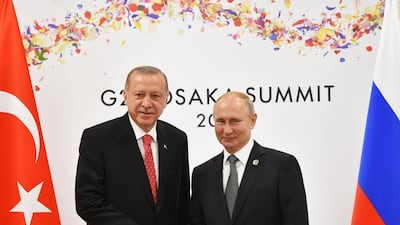Turkish President Recep Tayyip Erdogan’s decision to take delivery of a sophisticated Russian air defence system has put him on a collision course with Washington that could spell the end of Ankara’s long-standing membership of the Nato alliance.
The Trump administration has been highly critical of the recent $2 billion (Dh7.34bn) arms deal Mr Erdogan has negotiated with Moscow, which includes the delivery of Russia’s state-of-the-art S-400 anti-aircraft missile system.
The S-400 has been specifically designed by Russia to shoot down Nato warplanes, and the arrival of the first batch of missiles in Turkey last week has caused deep disquiet both within the Nato alliance and in Washington.
Nato Secretary General Jens Stoltenberg had previously called on Turkey not to go ahead with the deal, while in Washington senior officials at the Pentagon warned that it could end Turkey’s continued participation in the F-35 Joint Strike Fighter programme.
The F-35, the first Nato frontline fighter to be equipped with stealth technology, is set to become a key component in Nato’s front line defences for decades to come.
As a Nato member, Turkey was allowed to place an order for 100 F-35 fighters. But the Pentagon was unhappy that Ankara would have access to sophisticated American technology at the same time that it was doing arms deals with Russia, which Nato regards as constituting the gravest threat to the security of the alliance.
Washington has now responded by announcing it is to cancel Turkey's future participation in the F-35 programme.
In a terse statement issued on Wednesday, White House spokeswoman Stephanie Grisham stated: “Unfortunately, Turkey’s decision to purchase Russian S-400 air defence systems renders its continued involvement with the F-35 impossible.







“Turkey has been a longstanding and trusted partner and Nato ally for over 65 years, but accepting the S-400 undermines the commitments all Nato allies made to each other to move away from Russian systems.”
Washington's decision to cancel Turkey's participation in the F-35 programme will come as a bitter blow to Mr Erdogan, who appears to have laboured under the illusion that he could do arms deals with both Washington and Moscow at the same time.
And, at a time when Mr Erdogan appears more interested in cosying up to Moscow than reassuring his Nato allies, this damaging rift in relations between Washington and Moscow raises serious questions about Turkey’s future membership of Nato.
The decision by the Western powers to allow Turkey to join Nato in 1952 – the first and only Muslim-majority country to have done so – was taken because Turkey’s geographical location was deemed vital to protecting Nato’s eastern flank against Moscow.
This was at the height of the Cold War, when the Soviet Union was regarded as the main threat to the survival of the Western democracies.
The Soviet Union may no longer exist, but 30 years after the collapse of the Iron curtain, Moscow has re-emerged as posing a significant threat to the security of the Western alliance. And while Turkey’s role still remains vital to safeguarding Nato, the fact that Mr Erdogan’s government is prepared to defy Nato doctrine by forging a close relationship with Russian President Vladimir Putin inevitably raises questions about where Turkey’s true allegiance lies.
Furthermore, Nato concerns over the threat Russia poses to European security are likely to deepen further if, as seems likely, talks fail to save a key nuclear missile treaty with Russia.
Moscow has been given a deadline of August 2 to comply with the terms of the Intermediate-Range Nuclear Forces (INF) Treaty, signed between the US and the Soviet Union in 1987. Washington has accused Moscow of breaching the terms of the agreement by developing a new generation of mobile, medium-range missiles that are hard to detect and can carry nuclear warheads and could hit European capitals within a matter of minutes.
The Trump administration has said it will withdraw from the agreement if the Russians do not comply with its terms by the beginning next month. And with no sign that the Russians are about to do so, Mr Stoltenberg is warning that Nato will need to take a “measured, defensive” response.
“The INF treaty has been a cornerstone in arms control for decades and now we see the demise of the treaty,” he said in a recent interview with the BBC. “We have to be prepared for a world without the INF treaty and with more Russian missiles.”
All of which will increase Nato’s concern over Turkey’s decision to do arms deals with Moscow instead of its Nato allies. “It is a serious issue because it is a serious disagreement which involves two important allies [the US and Turkey],” Mr Stoltenberg said.
In many respects, other Nato member states should not be surprised by Mr Erdogan’s wilful disregard for the concerns of the Western alliance. There have been many occasions during the Syrian civil war when Ankara has been accused of supporting militant Islamist groups linked to Al Qaeda. Turkey also remains a staunch supporter of the Muslim Brotherhood, which is regarded as a terrorist organisation in much of the Arab world.
Consequently, Mr Erdogan may well find that the day is fast approaching when the Western alliance will no longer tolerate the Turkish leader’s double standards. With the imminent prospect of tensions between Russia and the West deepening further, Mr Erdogan may well find himself having to decide whose side he is on.
Con Coughlin is the Daily Telegraph’s defence and foreign affairs editor

